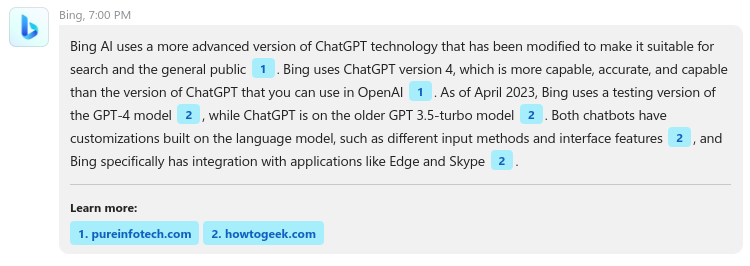This is a beginner guide to learning these new tools. What are these, and why would we want to know or use these technologies?
AI chatbots are computer programs that generate text based on prompts, which are text you type into the chat dialogue.
They differ from the common “customer service chatbot” because these can write about many different subjects, in different styles.
The two popular ones running today are OpenAI’s ChatGPT, and Microsoft Bing’s Chat.
How to Use ChatGPT
Go to the website.
Sign up for an account.
Get to the chat screen, and start writing questions.
How to Use Bing’s Chat
Go to bing.com, and sign up for the preview.
To run the bot, you need to do one of the following: install the Edge browser, or install Skype.
When you use Edge, you go to Bing and then click the “Chat” tab.
When you use Skype, Bing shows up in the left panel. You can chat with it like any other person or bot.
If you’re on mobile, use the Bing App, which uses voice recognition and speech synthesis to interact with you.
The Main Differences Between the Two
I don’t know the details about Bing Chat. Based on how the mobile app works, it appears to use ChatGPT to summarize the results of a search. When you ask it something, it converts your text into a concise search, and then generates a response that includes a few of the search results. So GPT is used to generate a conversational search result.
ChatGPT is trained on various documents, including some books, research papers, and other authoritative documents, computer code, and other documents.
ChatGPT’s answers cannot be referenced back to specific web pages. You can ask it to show references, but those references are fabricated. You may get references to actual books or papers.
TL;DR: Bing is giving you answers from web pages and can show you. ChatGPT is not, and references are faked. If you are doing research, use Bing.
I asked Bing to explain, and it was kind of wrong.

ChatGPT is going to 4 for the paid customers. The main difference is, Bing is using a training set that, somehow, links the output back to specific inputs. (This screen is from Skype.)
ChatGPT makes things up, as noted in ChatGPT: Discovers a “Memory Hole” or makes up sources.
ChatGPT is Great for Code
Though ChatGPT is a liar, of sorts, it’s better than Bing at teaching coding.
That’s because the training data set probably includes a lot of code. So it can semi-randomly generate code that works. It’s a good way to learn some kinds of computer programming.
Learning Marx with ChatGPT
It’s pretty good at Marxism. One of the problems with philosophy is that it’s hard to understand, because it’s so dense with ideas. ChatGPT can help, but you have to go back to original texts, and current debate, to know if ChatGPT’s bullshittery was correct.
Some Marxian stuff:
- ChatGPT: Marx on Quality and Quantity – this was good.
- ChatGPT on Nationalism – this was also good, but my post’s compiled from multiple prompts.
- ChatGPT: who writes about late 20th century neoliberalism and the national question – I don’t know if this was good. I would use it as a jumping off point to study the writers mentioned, and the subjects covered. I suspect numerous texts address this question a lot better.
- ChatGPT: compare trotsky’s book on fascism with dimitrov’s book on fascism – I don’t think this output really said very much that was useful. Moreover, the output about Guerin was useless.
TL;DR: So, what’s the pattern here?
The more general questions, which have probably been written about extensively, will generate better answers.
The more specific questions, which are probably not discussed or written about much, generate worse answers.
How Do these Models Generate Text
Text generation is semi-random. It’s similar to predictive text systems (autocomplete or autopredict) on your phone. If you don’t know what that is:
Imagine if that text database were much larger, and included millions of written documents.
A few things would happen:
- Some common phrases would emerge.
- You could come up with contexts or concepts by finding that phrases cluster.
Those are the two things that jumped out to me about ChatGPT – it could put concepts together.
How does it generate text?
That’s a tough question – because I haven’t studied it. What does Bing say?

Cool!
OK, but how does it know it’s generating a good text, instead of some random bullshit?
I don’t know. The basics are that the prompt is compared to the words, and the next word is influenced by the prompt.
The details are in the papers, and this is a summary of a few, by Daniel Dugas.
Getting Stupid
ChatGPT is designed to detect racism, hate, and other problematic text, and will refuse to produce it.
There’s a whole world of people trying to get around this, attempting a “jailbreak”.
I got it to write funny stories and scripts:
- ChatGPT: The Ghost of Marx
- ChatGPT: Crying in H-Mart with Karl Marx
- ChatGPT: Stop Asian Hate, the movie
- Chat GPT recommends some books, writes some stories
In the next post, I have some ideas about getting ready for this new world.
